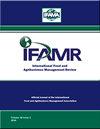Hometown effect on consumer preferences for food products
IF 1.5
4区 经济学
Q3 AGRICULTURAL ECONOMICS & POLICY
International Food and Agribusiness Management Review
Pub Date : 2023-02-13
DOI:10.22434/ifamr2021.0164
引用次数: 1
Abstract
This study examines how consumers’ hometown orientation affects their preferences for food products. Regarding food products, consumers may prefer products from their hometown over those produced in other domestic areas, among other factors. We consider that due to population migration, a consumers’ current or local place of residence may not necessarily be their hometown. After defining the hometown effect with a framework of consumer willingness to pay, we apply a double-bounded dichotomous choice contingent valuation method to value the hometown effect on a rice product, based on a consumer survey conducted in Japan. This study reveals that consumers’ hometown orientation significantly affects their preferences for the rice product produced in their hometown. The magnitude of the hometown effect for the product is estimated at 48 JPY (0.44 USD) per kg in terms of consumer willingness to pay. The premium rate of the hometown effect compared with the price of the base product is 12.4%. Food labels indicating more detailed region of origin information could be a potential marketing strategy to appeal to consumers from that region but currently living in other areas.家乡对消费者食品偏好的影响
本研究探讨消费者的家乡取向如何影响他们对食品的偏好。在食品方面,消费者可能更喜欢家乡生产的产品,而不是国内其他地区生产的产品。我们认为,由于人口迁移,消费者目前或当地的居住地不一定是他们的家乡。在消费者支付意愿的框架下定义了家乡效应之后,我们基于日本的消费者调查,应用双界二分类选择条件评估方法来评估家乡效应对大米产品的影响。本研究发现,消费者的家乡取向显著影响他们对家乡生产的大米产品的偏好。根据消费者的支付意愿,该产品的家乡效应估计为每公斤48日元(0.44美元)。家乡效应相对于基品价格的溢价率为12.4%。食品标签上注明更详细的原产地信息可能是一种潜在的营销策略,以吸引来自该地区但目前居住在其他地区的消费者。
本文章由计算机程序翻译,如有差异,请以英文原文为准。
求助全文
约1分钟内获得全文
求助全文
来源期刊

International Food and Agribusiness Management Review
AGRICULTURAL ECONOMICS & POLICY-
CiteScore
2.90
自引率
0.00%
发文量
0
审稿时长
>12 weeks
期刊介绍:
The IFAMR is an internationally recognized catalyst for discussion and inquiry on issues related to the global food and agribusiness system. The journal provides an intellectual meeting place for industry executives, managers, scholars and practitioners interested in the effective management of agribusiness firms and organizations.
IFAMR publishes high quality, peer reviewed, scholarly articles on topics related to the practice of management in the food and agribusiness industry. The Journal provides managers, researchers and teachers a forum where they can publish and acquire research results, new ideas, applications of new knowledge, and discussions of issues important to the worldwide food and agribusiness system. The Review is published electronically on this website.
The core values of the Review are as follows: excellent academic contributions; fast, thorough, and detailed peer reviews; building human capital through the development of good writing skills in scholars and students; broad international representation among authors, editors, and reviewers; a showcase for IFAMA’s unique industry-scholar relationship, and a facilitator of international debate, networking, and research in agribusiness.
The Review welcomes scholarly articles on business, public policy, law and education pertaining to the global food system. Articles may be applied or theoretical, but must relevant to managers or management scholars studies, industry interviews, and book reviews are also welcome.
 求助内容:
求助内容: 应助结果提醒方式:
应助结果提醒方式:


